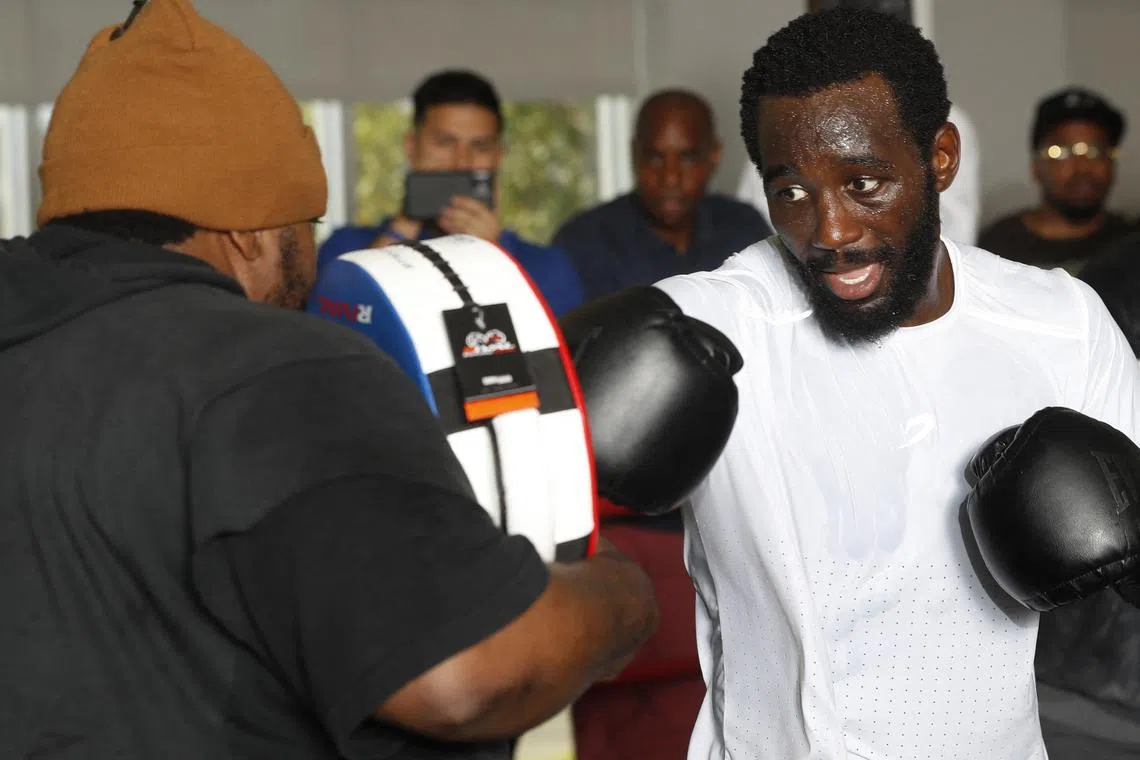Welterweight champ Terence Crawford calls for Professional Boxers Union
Sign up now: Get ST's newsletters delivered to your inbox

Terence Crawford (right) said he’s especially concerned about fighters who haven’t made it as far as he has in their careers.
PHOTO: AFP
Follow topic:
NEW YORK – Terence “Bud” Crawford, one of the biggest names in boxing, wants to make life better for his fellow fighters.
Crawford, the first welterweight boxer to take the top prize in all four professional championships in his weight class, has set out to create a professional boxing union.
“There are a lot of great fights that have been happening but, as a whole, there is a lot of cleaning up to be done for boxing to be where it needs to be. We don’t have a union, but there needs to be one,” he said in an interview.
At a moment when organised labour movements are notching some big wins or waging pitched battles for better contracts – from drivers to Hollywood actors – Crawford envisions a union that would guarantee the same types of benefits that big-league baseball, basketball and football players have in the United States.
Fresh off a decisive victory in the biggest fight of his career against Errol Spence Jr, he said in an interview in New York that boxers should be entitled to standard benefits such as pension plans, as well as group health insurance.
“A lot of fighters go broke after they finish fighting and that shouldn’t happen. If a fighter gets seriously damaged or hurt, he or she should have something backing them so they don’t have to look for money to help pay for their medical bills,” Crawford said.
Negotiating collectively could help boxers reap the benefits that other professional athletes have long enjoyed, said Catherine Fisk, an employment and labour law professor at the School of Law at University of California, Berkeley.
“They would get what every other unionised worker gets, which is employers contribute money to a pension plan, a retirement plan and then you are eligible for benefits. It is so much easier to run a health insurance programme and a retirement programme on a group basis rather than an individual basis,” Fisk said.
Crawford said he is especially concerned about fighters who have not made it as far as he has in their careers.
“It just takes unity. If all of the top fighters with a name and a brand behind them came together, we could make change,” he said.
Crawford has put together a list of other top-ranked fighters he believes could join with him to jump-start the process, though he has yet to reach out to them.
“We have different races, different ages, different countries – it’s everyone from all walks of life coming together. It can be done,” he said.
The world champion boxer, whose weight class requires him to weigh in at exactly 147 pounds (66.7kg), said the overall lack of business transparency is another reason for creating a union.
“The managers, the promoters, the advisers, they sometimes work together and it all works against the fighter,” he said.
The structure of boxing contracts vary depending upon the promotion and the stature of the fighter. Many world champion fighters earn a percentage of pay-per-view sales that can increase their compensation to seven or eight figures.
Opportunities to earn additional cash can also come from investments, endorsement deals and brands the athletes create themselves. Crawford, for instance, has partnerships with sports equipment company Everlast, sports drink Prime Hydration, Billionaire Boys Club fashion brand and athletic apparel company BoxRaw. Additionally Crawford says his real estate portfolio includes more than 100 properties in Nebraska, Missouri and Colorado.
For the rest of the professional boxing world, the financial reality is very different. Most fighters receive compensation based on an agreed-upon price. After they are paid, boxers then have to compensate their managers, trainers and reimburse a portion of their cut to pay for promotion.
Prize fighters need “to look at football, basketball and baseball”, said Fisk.
“These were really poorly paid jobs for most people who played until they unionised,” she added. In those sports, even entry-level players “have more control over how they monetise their athletic ability”.
Crawford wants to be at the forefront of that change for boxers.
“It’s definitely going to cause conflict and people are not going to want to see it, but it is going to be for the best,” he said. BLOOMBERG

